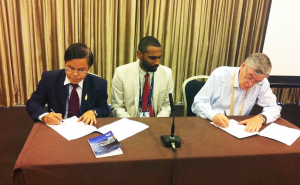NARIT to coordinate IAU development activities in South East Asia
Website: South East Asian Regional Office
 The National Astronomical Research Institute of Thailand (NARIT) has been selected to coordinate the International Astronomical Union (IAU) astronomy-for-development activities in the South East Asian region. The IAU signed an important agreement with NARIT who will host a Regional Node as part of the IAU’s decadal strategic plan which aims to realise the societal benefits of astronomy.
The National Astronomical Research Institute of Thailand (NARIT) has been selected to coordinate the International Astronomical Union (IAU) astronomy-for-development activities in the South East Asian region. The IAU signed an important agreement with NARIT who will host a Regional Node as part of the IAU’s decadal strategic plan which aims to realise the societal benefits of astronomy.
The strategic plan was ratified by IAU members in 2009, at the last General Assembly. Since then a global coordinating Office of Astronomy for Development (OAD) was established in Cape Town, South Africa, and has led the implementation of this plan. Director of the OAD Kevin Govender comments on the signing of this agreement:
“South East Asia has always been a fine example of regional cooperation in the field of astronomy and groups such as the South East Asian Astronomy Network and the South East Asian Young Astronomers Collaboration show how the astronomy field can be developed more effectively as a region. NARIT has played a particularly important role in terms of their leadership both in terms of research and human capital development.”
This year also sees a very challenging role of NARIT in the international stage as the institute is proposing to host the International Training Centre in Astronomy under the Auspices of UNESCO. The centre will be the international node that garners the knowledge of astronomy and capacity building activities of the global community.
Director of NARIT, Boonrucksar Soonthornthum, describes the important role of this Regional Node: “The necessity of a Regional Node in Thailand is inevitable and imperative to the development of astronomy in the entire region. It will facilitate the ongoing and emerging activities, create better channels of communication and mobilize the influx of knowledge transfer and human resource to the region. Furthermore, the existence of this node in Thailand will pinpoint South East Asia in the global community of astronomy as the region of sustainable development.”
In 2007 NARIT initiated the Southeast Asia Astronomy Network (SEAAN) with its aim to strengthen the research work and education activities among the ten member countries in South East Asia, namely, the State of Brunei Darussalam, the Kingdom of Cambodia, the Republic of Indonesia, Lao PDR, Malaysia, The Union of Myanmar, the Philippines, the Republic of Singapore, Thailand and the Socialist Republic of Vietnam.
This agreement is the second of its kind to be signed anywhere in the world, the first being for the East Asian region based in China. It follows the IAU’s Announcement of Opportunity that went out in January 2012 which attracted 31 letters of intent and 15 full proposals (received from every populated continent) to establish similar coordinating nodes elsewhere.

